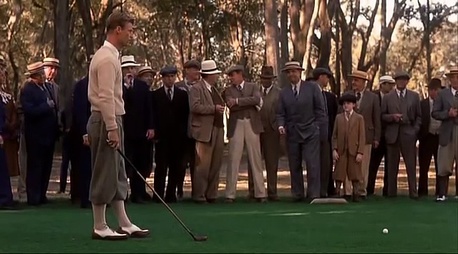
Bagger Vance: Yep... Inside each and every one of us
is one true authentic swing... Somethin' we was born with... Somethin' that's ours and ours alone... Somethin' that
can't be taught to ya or learned... Somethin' that got to
be remembered... Over time the world can, rob us of
that swing... It get buried inside us under all our
wouldas and couldas and shouldas... Some folk even
forget what their swing was like... –- The Legend of
Bagger Vance
A kind of similar metaphor can be found on a playground with a playground swing which acts as a pendulum. Pushing a person in a swing in time with the natural interval of the swing (its resonant frequency) makes the swing go higher and higher (maximum amplitude), while attempts to push the swing at a faster or slower tempo produce smaller arcs. This is because the energy the swing absorbs is maximized when the pushes are "in phase" with the swing's natural oscillations, while some of the swing's energy is actually extracted by the opposing force of the pushes when they are not.”
(https://en.wikipedia.org/wiki/Resonance)
In mentoring, coaching, and hosting the true authentic swing, the resonance in the relationships is an essential foundation for change and development. In a trustful mentor-mentee-relationship the seasoned mentor is open and tries to get into resonance with the autonomous world of the mentee.
In his concept of integral health Belschner speaks about the resonance process and adds the transpersonal (spiritual) dimension which was so far missing in previous health concepts to his way of modeling “integral health”. Two premises are given by Belschner:
- Basically a human being seeks a meaningful life and tries to make sense
- A human being can only find meaning when he or she knows to belong something greater than
him- or herself
Against the background of integral health or seeking a meaningful life or finding one’s own calling the resonance process in the mentor-mentee-relationship is also of paramount importance. But what is resonance in a human developmental relationship as it occurs in mentoring and coaching? The mentor is able to open himself to his inner emerging resonances and to interpret those resonances as observations and calls for action. In mentoring dialogues the mentor discerns (to a large extent) the generated resonances unbiased. The perceptions are to be interpreted in a reference system. Is there a humanistic reference system available to the mentor, he can interpret himself and the mentee in this reference system of dignity, beauty, respect, esteem etc. His self-reflective social and ecological acting radiates accordingly. The importance of our reference system in which we interpret our existential encounters becomes immediately recognizable when we exchange the above mentioned values with values such as exploitation, competition, greed, violence, force etc. [Belschner 2002}
According to Belschner the quality of the resonance process does depend on the mentor’s subtlety of consciousness structures and the suite of metaphors he has. Questions Belschner formulated around this topic are:
How subtle are the consciousness structures of the helper?
Which personal and transpersonal (spiritual) consciousness qualities are open to him?
Is the helper for example capable of holding a transpersonal quality such as wholeheartedly embracing the other or holding available stillness in the relationship with the other person thereby the “client” can develop into such a quality?
Scope of metaphorical repertoire:
Helpers differ in the scope of metaphorical repertoire with regard to transitional metaphors by which situations are symbolically enlightened.
Flexibility:
Helpers differ in their competence of situational related employment of transitional metaphors.
Fitting of metaphors:
The degree of the fitting between action-relevant metaphors of the “client” and host may vary. The degree of the fitting impacts the degree of the pace, the depth of development, the sense of being understood and well-being.
Metaphors are tools in this context in order to acquaint somebody with an unknown subject matter by means of an analogy or to enrich an existing perspective by a new perspective or a new approach on a given subject matter.
By means of metaphors we are often capable of referring to more familiarized realities in which we find [more easily] our paths via the orientations offered by the metaphors.*
is one true authentic swing... Somethin' we was born with... Somethin' that's ours and ours alone... Somethin' that
can't be taught to ya or learned... Somethin' that got to
be remembered... Over time the world can, rob us of
that swing... It get buried inside us under all our
wouldas and couldas and shouldas... Some folk even
forget what their swing was like... –- The Legend of
Bagger Vance
A kind of similar metaphor can be found on a playground with a playground swing which acts as a pendulum. Pushing a person in a swing in time with the natural interval of the swing (its resonant frequency) makes the swing go higher and higher (maximum amplitude), while attempts to push the swing at a faster or slower tempo produce smaller arcs. This is because the energy the swing absorbs is maximized when the pushes are "in phase" with the swing's natural oscillations, while some of the swing's energy is actually extracted by the opposing force of the pushes when they are not.”
(https://en.wikipedia.org/wiki/Resonance)
In mentoring, coaching, and hosting the true authentic swing, the resonance in the relationships is an essential foundation for change and development. In a trustful mentor-mentee-relationship the seasoned mentor is open and tries to get into resonance with the autonomous world of the mentee.
In his concept of integral health Belschner speaks about the resonance process and adds the transpersonal (spiritual) dimension which was so far missing in previous health concepts to his way of modeling “integral health”. Two premises are given by Belschner:
- Basically a human being seeks a meaningful life and tries to make sense
- A human being can only find meaning when he or she knows to belong something greater than
him- or herself
Against the background of integral health or seeking a meaningful life or finding one’s own calling the resonance process in the mentor-mentee-relationship is also of paramount importance. But what is resonance in a human developmental relationship as it occurs in mentoring and coaching? The mentor is able to open himself to his inner emerging resonances and to interpret those resonances as observations and calls for action. In mentoring dialogues the mentor discerns (to a large extent) the generated resonances unbiased. The perceptions are to be interpreted in a reference system. Is there a humanistic reference system available to the mentor, he can interpret himself and the mentee in this reference system of dignity, beauty, respect, esteem etc. His self-reflective social and ecological acting radiates accordingly. The importance of our reference system in which we interpret our existential encounters becomes immediately recognizable when we exchange the above mentioned values with values such as exploitation, competition, greed, violence, force etc. [Belschner 2002}
According to Belschner the quality of the resonance process does depend on the mentor’s subtlety of consciousness structures and the suite of metaphors he has. Questions Belschner formulated around this topic are:
How subtle are the consciousness structures of the helper?
Which personal and transpersonal (spiritual) consciousness qualities are open to him?
Is the helper for example capable of holding a transpersonal quality such as wholeheartedly embracing the other or holding available stillness in the relationship with the other person thereby the “client” can develop into such a quality?
Scope of metaphorical repertoire:
Helpers differ in the scope of metaphorical repertoire with regard to transitional metaphors by which situations are symbolically enlightened.
Flexibility:
Helpers differ in their competence of situational related employment of transitional metaphors.
Fitting of metaphors:
The degree of the fitting between action-relevant metaphors of the “client” and host may vary. The degree of the fitting impacts the degree of the pace, the depth of development, the sense of being understood and well-being.
Metaphors are tools in this context in order to acquaint somebody with an unknown subject matter by means of an analogy or to enrich an existing perspective by a new perspective or a new approach on a given subject matter.
By means of metaphors we are often capable of referring to more familiarized realities in which we find [more easily] our paths via the orientations offered by the metaphors.*


 RSS Feed
RSS Feed
